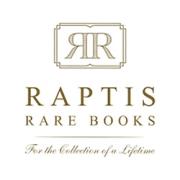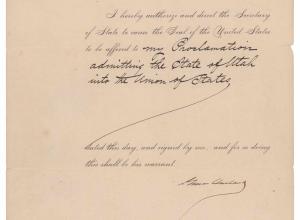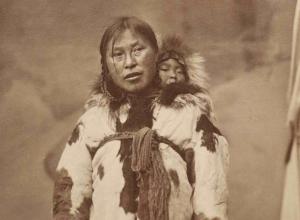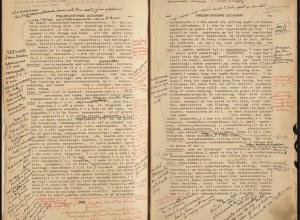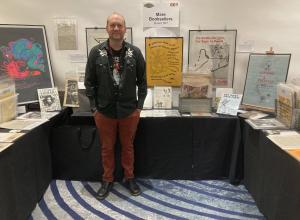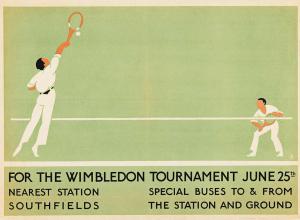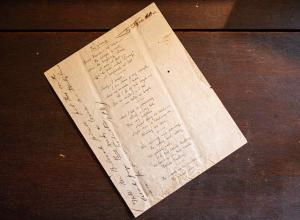Library of Congress Launches Leonard Bernstein Centennial Celebration
In celebration of the 100th anniversary of Leonard Bernstein’s birth, the Library of Congress has made available online—for the first time—musical manuscripts and scrapbooks from the legendary composer’s personal and professional archives housed in the nation’s library. These digital offerings and others nearly tripled the existing content at loc.gov/collections/leonard-bernstein/about-this-collection/. The public can now access for free more than 3,700 items, including photos, writings, correspondence, scripts, musical sketches, scrapbooks and audio recordings. This web presentation is a revealing snapshot of Bernstein’s extensive collection at the Library.
“Bernstein arguably was the most prominent musical figure in America in the second half of the 20th century,” said Mark Horowitz, curator of the Leonard Bernstein Collection. “A polymath—a Renaissance man—he was a composer, conductor, pianist, educator and social activist. He composed musicals, ballets, operas, film scores, a mass, chamber music and symphonies.”
New online content includes materials on Bernstein’s involvement in the civil rights movement, his time as a student at Harvard and scripts for the “Ford Presents” and “Omnibus” programs. Other highlights include:
?? “West Side Story” outlines, synopses and notes, including an early synopsis titled “Romeo and Juliet” in which the gangs pit Jews against Catholics as opposed to Anglos versus Hispanics;
?? “West Side Story” audition notes, including Bernstein’s comments about Warren Beatty’s audition for the role of Riff (“Good voice - can’t open jaw - charming as hell - cleancut”);
?? All of Bernstein’s musical sketches for “Candide,” including “Glitter and Be Gay” (titled “Cunegonde’s Jewel Song”); “I Am Easily Assimilated” (originally titled “Old Lady’s Jewish Tango”) and “Overture”;
?? Materials relating to the Black Panther Party fundraiser that resulted in the famous Tom Wolfe article in New York Magazine, “Radical Chic: That Party at Lenny’s”; also included are letters from Coretta Scott King, Gloria Steinem and Jacqueline Kennedy Onassis;
?? A sound recording of Bernstein’s sermon, “Hope in the Nuclear Age,” presented at the All Souls Unitarian Church, Jan. 27, 1985.
The Bernstein Collection consists of an estimated 400,000 items, one of the largest and most varied in the Library’s Music Division. In addition to music and literary manuscripts, personal correspondence, audio and video recordings, fan mail, business papers, photographs and datebooks, there are unexpected items that range from passports and license plates to batons and the suit in which Bernstein conducted his New York Philharmonic debut in 1943. Also among these unusual items are Bernstein’s notes for a Holocaust opera (tentatively titled “Babel”) he was working on the year of his death; a manuscript for an unproduced circa 1941 ballet, “Conch Town” that included the music for what became “America” from “West Side Story”; and a seven-page, color-illustrated letter to his mother documenting a trip to Israel during the 1948 war.
The conductor’s collection is also one of the most heavily used in the Music Division. Among its researchers is Bernstein’s own daughter, who is working on a memoir. “It’s beyond gratifying to see that not only musicians and scholars can access these materials, but also students of all ages, and in fact virtually anyone on the planet with an internet connection,” said Jamie Bernstein. “The word I so often find myself using to describe my father is not a word he knew in his lifetime: broadband. The Bernstein collection has this same broadband quality.”
In addition to the expanded website, the Library will celebrate the Bernstein centennial with a spring mini-fest of activities May 12-19 drawn from the richness of the collection. On Friday, May 18, the Library will present an evening of excerpts from three of Bernstein’s major stage works—the musical “1600 Pennsylvania Avenue” and the operas “Trouble in Tahiti” and “A Quiet Place”—and other extraordinary rarities from the Library’s collection. On Saturday, May 19, rarely seen materials will be on display, providing an illuminating portrait of the man and the artist and informal behind-the-scenes presentations and performances will uncover fascinating details about “West Side Story,” “Candide” and “On the Town.” The celebration also includes film screenings, which include “On the Waterfront,” a National Film Registry classic scored by Bernstein. More information about events can be found at loc.gov/concerts/bernstein100.html.
The Music Division at the Library of Congress contains an unparalleled collection of manuscripts, scores, books, libretti, music-related periodicals and microforms, copyright deposits and music instruments. Manuscripts of note include those of European masters such as Mozart, Beethoven and Brahms and those of such American masters as George and Ira Gershwin, Aaron Copland, Samuel Barber and Charles Mingus. More information can be found at loc.gov/rr/perform.
The Library of Congress is the world’s largest library, offering access to the creative record of the United States—and extensive materials from around the world—both on-site and online. It is the main research arm of the U.S. Congress and the home of the U.S. Copyright Office. Explore collections, reference services and other programs and plan a visit at loc.gov, access the official site for U.S. federal legislative information at congress.gov and register creative works of authorship at copyright.gov.





